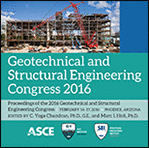Development of Empirically-Based Fragilities of Residential Damage in the 2011 Joplin, Missouri, Tornado
Publication: Geotechnical and Structural Engineering Congress 2016
Abstract
Performance-based engineering (PBE) is a methodology that requires specification on a range of performances or target reliabilities for structures of different importance. Information on these ‘performance levels’ require a probabilistic assessment of the potential factors that may influence a design, including information on the hazard, load, resistance, loss estimates, expert opinion and public perception. This paper describes one such probabilistic assessment in the development of empirically-based fragility functions for tornadoes using damage assessment data and a tornado wind field model for the 22 May 2011 Joplin, MO tornado. The damage assessment data was collected during field surveys of more than 1,240 structures in the aftermath of the tornado, using provisions of the Enhanced Fujita (EF) Scale to assess the damage. The wind field model was developed from the tree-fall patterns noted in the damage path of the tornado. Fragility functions were developed for the degrees of damage (DOD) associated with one- and two-family residences in the EF Scale. The empirically-derived fragility functions were progressive in nature, with median wind speeds varying from 33.6 m/s for initiation of visible damage to 85.2 m/s for complete destruction. These functions were compared to existing fragility functions for straightline winds to evaluate potential differences in failure mechanisms for structures exposed to tornadoes. Wind speeds associated with the median failure probability were used to estimate load factors, defined as the square of the ratio of the straightline wind speed to the tornado wind speed. Structures tended to fail at lower wind speeds in tornadoes than in straightline winds, with load factors between 1.32 and 1.51. A fragility assessment in the context of PBE naturally requires attribution and quantification of all uncertainties. Uncertainties in the fragility functions were estimated in this study through cross-validation methods. Preliminary results show variance in fragility parameters is higher for higher damage states but all damage states have uncertainty less than 10%.
Get full access to this article
View all available purchase options and get full access to this chapter.
Information & Authors
Information
Published In
Copyright
© 2016 American Society of Civil Engineers.
History
Published online: Feb 8, 2016
Authors
Metrics & Citations
Metrics
Citations
Download citation
If you have the appropriate software installed, you can download article citation data to the citation manager of your choice. Simply select your manager software from the list below and click Download.
